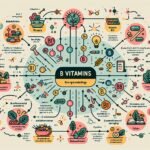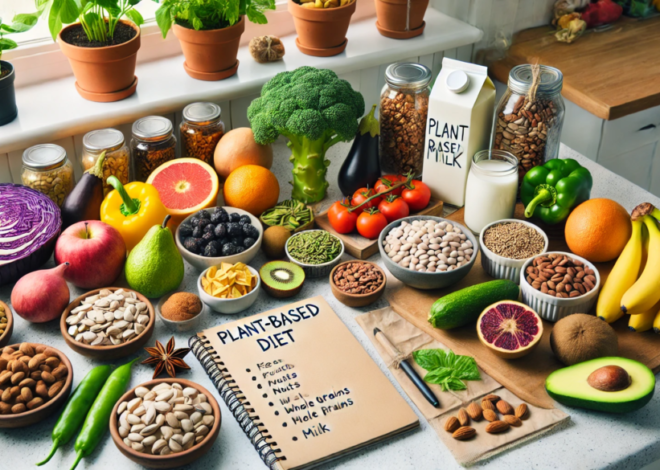
Plant-Based Diets: Benefits and Meal Ideas
If you’re looking to improve your health and reduce your environmental impact, a plant-based diet may be the way to go. Plant-based diets focus on whole, minimally processed foods that come from plants, such as fruits, vegetables, grains, legumes, nuts, and seeds, while minimizing or eliminating animal products like meat, dairy, and eggs.
One of the biggest benefits of a plant-based diet is that it can reduce your risk of chronic diseases like heart disease, diabetes, and certain types of cancer. Plant-based diets are generally high in fiber, vitamins, minerals, and antioxidants, which can help protect your cells from damage and inflammation. Additionally, plant-based diets are often lower in saturated fat and cholesterol, which can contribute to heart disease.
If you’re interested in trying a plant-based diet, there are plenty of delicious and nutritious meal ideas to choose from. Some popular plant-based meals include salads, stir-fries, soups, curries, and grain bowls. You can also experiment with plant-based versions of your favorite dishes, such as veggie burgers, tofu scrambles, and cashew cheese. By incorporating a variety of colorful fruits, vegetables, grains, and legumes into your meals, you can ensure that you’re getting all the nutrients your body needs.
Health Benefits of Plant-Based Diets
Plant-based diets are becoming increasingly popular due to their numerous health benefits. Here are some of the benefits you can expect when you switch to a plant-based diet.
Weight Management
A plant-based diet can help you maintain a healthy weight. Plant-based foods are generally lower in calories and higher in fiber, which can help you feel full and satisfied. They are also rich in nutrients, which can help your body function properly and maintain a healthy weight. Studies have shown that people who follow a plant-based diet tend to have a lower body mass index (BMI) than those who consume a diet that is high in animal products.
Chronic Disease Prevention
Plant-based diets have been linked to a reduced risk of chronic diseases such as heart disease, type 2 diabetes, and certain types of cancer. This is because plant-based foods are packed with nutrients and antioxidants that help protect your body against disease. For example, a study published in the Journal of the American College of Cardiology found that a plant-based diet was associated with a lower risk of heart disease.
Improved Digestion
Plant-based diets are rich in fiber, which can help improve your digestion. Fiber helps keep your digestive system running smoothly by promoting regular bowel movements. It can also help prevent constipation and other digestive problems. Additionally, plant-based diets tend to be lower in fat and processed foods, which can also help improve your digestion.
Enhanced Nutrient Intake
Plant-based diets are rich in a variety of nutrients, including vitamins, minerals, and antioxidants. By consuming a wide variety of plant-based foods, you can ensure that you are getting all the nutrients your body needs to function properly. For example, leafy green vegetables are a great source of iron, while nuts and seeds are rich in healthy fats and protein.
In summary, a plant-based diet can offer numerous health benefits, including weight management, chronic disease prevention, improved digestion, and enhanced nutrient intake. By incorporating more plant-based foods into your diet, you can improve your overall health and well-being.
Implementing a Plant-Based Diet
Transitioning to a plant-based diet can be challenging, but with proper planning and knowledge, it can be a rewarding and healthy lifestyle choice. Here are some essential tips to help you implement a plant-based diet.
Essential Nutrients and Sources
When following a plant-based diet, it’s essential to ensure that you’re getting all the necessary nutrients. Some of the most important nutrients to focus on include protein, iron, calcium, vitamin B12, and omega-3 fatty acids.
Good sources of plant-based protein include legumes, nuts, seeds, and whole grains. Iron can be found in leafy greens, beans, lentils, and fortified cereals. Calcium can be obtained from leafy greens, fortified plant milks, and tofu. Vitamin B12 is only found in animal products, so it’s important to take a supplement or consume fortified foods. Omega-3 fatty acids can be found in flaxseed, chia seeds, and walnuts.
Planning Balanced Meals
To ensure that you’re getting all the necessary nutrients, it’s crucial to plan your meals carefully. Aim to include a variety of fruits, vegetables, whole grains, legumes, nuts, and seeds in your diet.
To make meal planning easier, consider using a meal-planning app or website. Some popular options include Plant Jammer, Mealime, and Forks Meal Planner.
Tips for Dining Out
Eating out on a plant-based diet can be challenging, but it’s not impossible. Many restaurants offer plant-based options, and some even have dedicated plant-based menus.
When dining out, don’t be afraid to ask for modifications to dishes to make them plant-based. For example, ask for a veggie burger without cheese or a salad without meat.
Overcoming Common Challenges
One of the biggest challenges of a plant-based diet is dealing with social situations. It can be difficult to navigate family gatherings, parties, and other events where plant-based options may be limited.
To overcome these challenges, consider bringing your own plant-based dish to share or eating before you go to an event. You can also communicate your dietary restrictions to the host or restaurant in advance to ensure that there are plant-based options available.
Remember that transitioning to a plant-based diet is a process, and it’s okay to make mistakes along the way. With time and practice, you’ll become more confident in your ability to follow a plant-based lifestyle.
Frequently Asked Questions
What are the health benefits of following a plant-based diet?
Plant-based diets have been linked to numerous health benefits, such as lower risk of heart disease, diabetes, and certain types of cancer. They are also rich in fiber, vitamins, and minerals, and can help with weight management. By focusing on whole, minimally processed plant foods, you can ensure that you are getting all the nutrients your body needs to thrive.
How can I start a plant-based diet as a beginner?
Starting a plant-based diet can be overwhelming, but it doesn’t have to be. Begin by incorporating more plant-based meals into your diet gradually. Focus on whole, unprocessed foods such as fruits, vegetables, whole grains, nuts, and seeds. Experiment with different recipes and cuisines to find what you enjoy. Remember that everyone’s journey is different, and it’s okay to take it one step at a time.
What are some simple plant-based meals for everyday dining?
There are plenty of simple and delicious plant-based meals that you can enjoy every day. Some examples include oatmeal with fruit and nuts for breakfast, a quinoa and black bean bowl for lunch, and a stir-fry with veggies and tofu for dinner. Snacks can include fresh fruit, veggies with hummus, or a handful of nuts.
Which foods should I include in a basic plant-based diet shopping list?
When shopping for a plant-based diet, focus on whole, unprocessed foods. Some staples to include in your shopping list are fresh fruits and vegetables, whole grains, legumes, nuts, and seeds. You can also incorporate plant-based milk, tofu, and tempeh for added variety.
Can you provide a sample one-week meal plan for a plant-based diet?
Sure! Here is a sample one-week meal plan for a plant-based diet:
- Breakfast: Overnight oats with fruit and nuts
- Snack: Apple with almond butter
- Lunch: Quinoa and black bean bowl with avocado and salsa
- Snack: Carrots and hummus
- Dinner: Lentil soup with whole grain bread
- Breakfast: Smoothie with banana, spinach, and almond milk
- Snack: Trail mix with nuts and dried fruit
- Lunch: Chickpea salad with veggies and a whole grain pita
- Snack: Roasted edamame
- Dinner: Stir-fry with veggies and tofu over brown rice
- Breakfast: Avocado toast with a side of fruit
- Snack: Peanut butter and banana
- Lunch: Sweet potato and black bean tacos
- Snack: Roasted chickpeas
- Dinner: Veggie burger with sweet potato fries
What are some nutritious and satisfying plant-based dinner options for newbies?
If you’re new to a plant-based diet, there are plenty of nutritious and satisfying dinner options to try. Some examples include lentil soup, veggie stir-fry, sweet potato and black bean tacos, and veggie burgers. Experiment with different flavors and cuisines to find what you enjoy.











